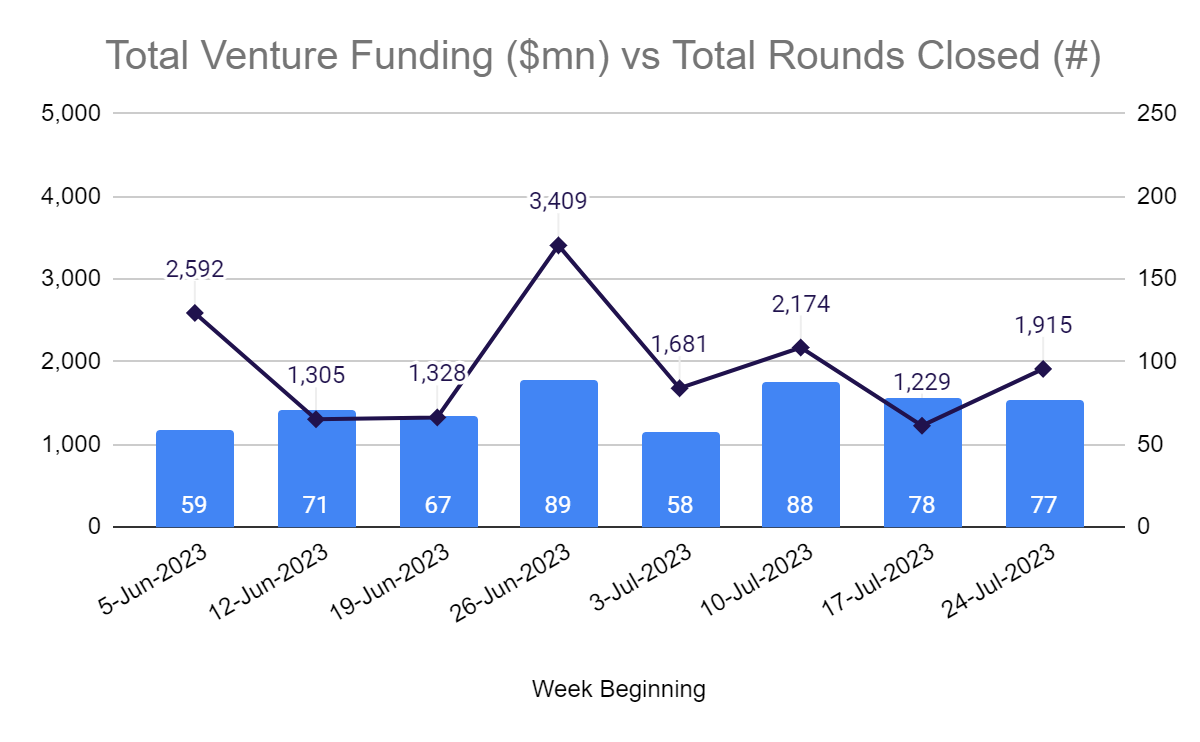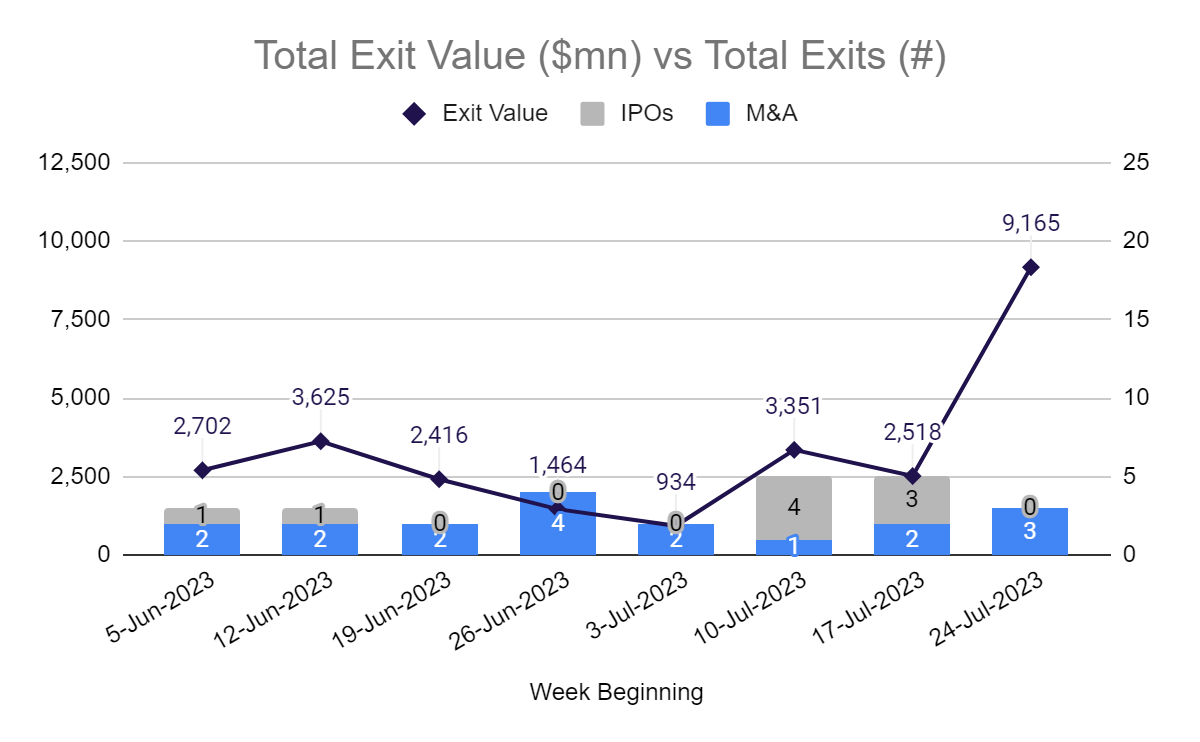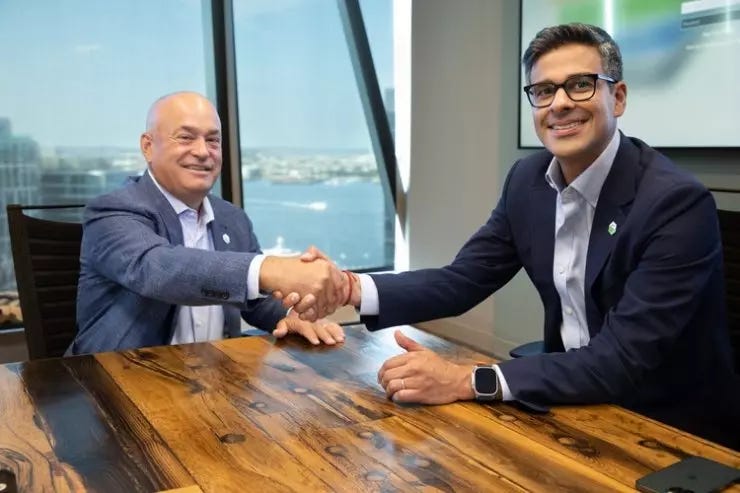Last Week in Deeptech - 01/08/2023
Welcome to the Deepsight weekly newsletter, where we run through last week's notable events in deeptech.
Last Week in News:
NASA distributed $150mn to 11 US organizations supporting human explorations on the Moon, including Jeff Bezos’s Blue Origin which netted $35mn (The Science Times)
Leading European fusion startup offered term sheet to build its tech in US (Sifted)
OpenAI, Google, Microsoft and Anthropic form their own ‘body’ on AI (Techcrunch)
French investigate Chinese, locals over chip-spying allegations (Bloomberg)
TL;DR - Venture Markets:
77 deeptech ventures collectively raised $1,915mn from investors.
3 VC funds announced closure, raising $715mn from limited partners.
3 companies achieved exits, creating $9,165mn in value for shareholders.


Featured Insights:
Talking Tech Transfer: Neil Gordon (Global University Venturing)
De-Risking Deep Tech Startups (Moien Giashi)
Tech Breakthroughs & Partnerships:
Altana has been awarded a contract with US Customs & Border Protection to prevent goods produced using forced labour from coming into the country, using AI (Axios)
In-space logistics startup Atomos Space is set to launch its first mission with SpaceX to demonstrate its rendezvous, docking and refuelling capabilities in orbit (Techcrunch)
NASA and DARPA have selected Lockheed Martin to develop a spacecraft to demo nuclear propulsion technologies in Earth orbit later this decade (Space News)
Russian scientists present a 16-qubit quantum computer (The Quantum Insider)
AutoFlight successfully flew three eVTOL simultaneously (Electrek)
Our Top 10 Funding Picks:
Space DOTS, which develops modular devices to test materials in orbit, has bagged $1.5m in pre-seed funding to commercialise their first product: the Barnacle DOT.
Space logistics startup Impulse Space, headed up by founding SpaceX employee Tom Mueller, has closed an oversubscribed $45mn Series A round led by RTX Ventures.
AI and quantum mechanics startup Materials Nexus $2.6mn seed round, led by Ada Ventures, to create higher performing and more sustainable materials at lower costs.
NK:IO, an Imperial College spinout developing cell therapies for treating solid tumour cancers, has raised an additional £1.2mn ($1.5mn) to start running pre-clinical trials.
Collaborative Robotics announced it has raised $30mn in Series A investment led by Sequoia Capital to begin scaling early field deployments and manufacturing of its cobot.
DIF Capital Partners are to invest $200mn into Field to accelerate the development and buildout of its grid-scale battery energy storage projects in the UK and Western Europe.
Q-CTRL adds Morpheus Ventures to Series B round with a total of $54mn raised.
Ground-segment-as-a-service provider Leaf Space has closed $22.1mn in Series B financing, as well as an additional $16.6mn in venture debt through an EIB loan.
A-Alpha Bio has raised $22.4mn in Series A2 funding to scale their protein-protein interaction data platforms and to accelerate their internal pipeline development.
Silicon Quantum Computing has closed their Series A round at $50.4mn - more than doubling their valuation to $195mn in the process - but fell short of their $130mn goal.
See the full list here.
Announced VC Fund Closes:
United Ventures has announced the first close of a new fund at €65m, with a target size of €150m, to back startups developing solutions for “as-of-yet undigitised sectors”.
Australian VC firm Main Sequence, which was founded by Australia’s national science agency CSIRO, has raised AUS$450mn (US$303mn) for the first close of its third fund.
Prime Movers Lab closed its 3rd early-stage fund at $245mn to advance breakthrough science startups that can revolutionize the world's most important industries.
Champagne-Worthy Exits (M&A & IPOs):
Biogen has entered into an agreement to acquire neurological disease specialist Reata Pharmaceuticals for $7.3bn, a 60% premium to Reata’s closing share price on Friday.
French aerospace manufacturer Safran Group has agreed to acquire the flight control systems business of RTX-owned Collins Aerospace at an enterprise value of $1.8bn.
Carmell Therapeutics, a regenerative medicine company, announced the execution of their merger with Axolotl Biologix for $65mn, a fellow regenerative medicine company developing products for active soft tissue repair, aesthetics and orthopedic indications.
Key Hires and People Movements:
PTC announced that Neil Barua, President of Service Lifecycle Management, will succeed James Heppelmann as CEO, who is retiring after 13 years in the role.
Editas Medicine has appointed Linda Burkly as their new Chief Scientific Officer to lead the company’s drug discovery team and activities with experimental medicines.
Hydrogenpro announced that CFO Martin Thanem Holtet will be on parental leave until 10 November, during which time Ida Eilertsen Nygård will step in as acting CFO.
Cutera, a leading provider of aesthetic and dermatology solutions, has appointed Taylor Harris as CEO, succeeding Sheila Hopkins, who has been serving as Interim CEO.
Policy & Government Initiatives:
In the UK, The Department for Science, Innovation and Technology (DSIT) has unveiled a Research Ventures Catalyst fund that will supply up to £50mn ($64.5mn) for science and technology research. (You can read about the announcement in UKTN)
In the EU, work is underway to encourage the use of multiple vote share structures that enable founders to maintain control when listing on a public market. But as noted in Science Business “deep tech investors (such as Voima Ventures) see no added value in the move.”
In the world of US national security & defense, Mike Bloomberg recently published his opinion in Defense News, stating that “To innovate, DoD must be allowed to move faster”, highlighting the Defense Department’s antiquated acquisition system as a major bottleneck.
Lux Capital Founding Partner Josh Wolfe also testified in Congress as part of the discussion surrounding how to ensure US leadership in the critical and emerging technologies of the 21st century. (You can watch the full hearing on youtube here)
And lastly, in the ever-ongoing discussion surrounding AI regulation, Techcrunch put together a couple of good pieces on “The twin risks: moving too slow and moving too fast ” that AI leaders appear to envisage following a recent Senate Judiciary Committee hearing, and also “Six ways that AI could change politics.”
That’s all for this week!
As always, if you aren’t subscribed already, feel free to sign up below to get notifications straight into your inbox, and to join the growing Deepsight community.
If you have any feedback - or want to see more of something covered in the newsletter - please do contact me via email: dan@deepsight.news.
Thanks for reading!
Dan



